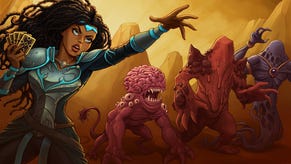PopCap's Ed Allard
PopCap's Seattle studio head on casual versus core, new business models and Unpleasant Horse
Internally we have a lot of discussion about lead platform, because it's a constantly moving target. But one thing about PopCap is that we're really not one big single studio. We're really a group. We've got four different studios worldwide, we're really kind of a collection of 30-40 active game projects at any given time. Each one of those operates, not really independently, but in the best way that works for that team. So when we think about lead platform, we've kind of shied away from, as a company, saying "our lead platform is iOS or browser". What we do is to look at a new platform and see what's right for it. What's the right lead platform for this.
In some cases we've got new IP where the lead platform will be social networks, in some cases it's leading on iOS and in some cases on PC. So it's really kind of a mix. We let the game teach us what the best lead platform is, then we figure out how to adapt to new platforms.
A creative release valve is one great way of thinking about it. In some ways it's a reflection of our internal processes, to invest back into the studio and the people. The best way to learn how to make games is to make games. You've got to have the room to make mistakes and try stuff.
So 4th & Battery is less about trying to be commercially successful than it is about trying to create a place where the people within PopCap have the room to experiment, make some mistakes, learn from those mistakes in a rapid iteration timeframe without having the pressures of schedules or revenue forecasts attached to it.
We're pretty harsh on ourselves. We can a lot of stuff because we don't think it's got what it takes to be a great franchise.
It's one part release valve, once part training ground. Some of the stuff we come up with we love, and we wish we could share with people. Not necessarily mass market but... things like Unpleasant Horse, we think there's people out there that would get a kick out of it.
We're pretty harsh on ourselves. We can a lot of stuff because we don't think it's got what it takes to be a great franchise. It's tough to completely mothball something. If we can tighten it up a little bit and bring it to the public, then it makes us feel a little bit better from a team perspective. Who knows, we could connect with some people.
Well, just like it's an experimental ground from a design perspective, we're also using it to explore and learn from a business and publishing perspective too. So we'll probably, if an idea lends itself, we'll experiment with some monetisation methods. But mostly it's about connecting with people and learning.
It may be commercial in the sense of experimenting with monetisation, it won't be commercial in the sense that we won't be investing heavily in a successful secondary brand from an important business perspective. The analogy I use is Pixar shorts. Sure, you can go to iTunes and buy the latest Pixar short, but for most part they give those things away. You go see a Pixar movie and you get to see a short at the beginning and it's pretty cool.
They're really about training up directors and testing out new technologies and those sort of things.








